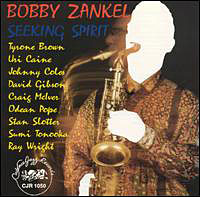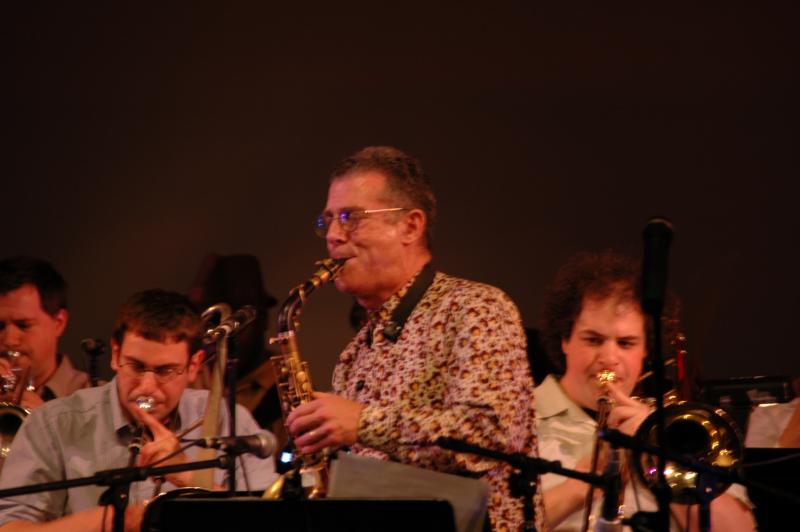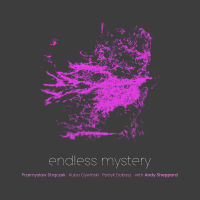Home » Jazz Articles » Interview » Bobby Zankel: Peaceful Jazz Warrior
Bobby Zankel: Peaceful Jazz Warrior
 About Jazz Writers and Critics
About Jazz Writers and CriticsAAJ: On a different note, though it's related to what we've been talking about, somewhere in this firmament of creativity and new music, the jazz writer/critic/journalist plays some kind of mediating role between the musicians and the audience, perhaps even setting the pace at times, through their assessments of recordings and concerts. As someone on the cutting edge as a musician, which writers do you personally value, and why?
BZ: Well, you know its two different things. First of all, I think it's very important to write about jazz and let people know what's happening. In my opinion, to be a critic, you should perhaps know as much about music as I do, as a composer and performer. It's an ancient question as to whether you need to know a lot about the music or just be a music lover. Like in 1963, they said that "Eric Dolphy is playing anti-jazz" or "Eric Dolphy can't play chord changes." Did they know what they were talking about?
AAJ: Too much of what is written is opinionated, rather than consisting of commentary and analysis.
BZ: And it's easier to sound smart if you criticize someone than if you compliment them. And everybody wants to sound smart.
Sometimes people come up to me and say, "You sound great." Compared to what? OK, maybe you liked and appreciated it. But who are you to say what's great? You know, it all really leads up to the fact that the place of jazz in business and society is such a painful subject, maybe a losing battle. What's written is very important in that respect. I was lucky early on in that I got a lot of good articles, and I knew people in Philly who were good writers. When I was young, I remember that Cecil had certain critics who really liked him and helped him. But it's easier to remember the people who said he was playing the piano like a jackhammer, and I watched Cecil really suffer in a way from that.
AAJ: Musicians have been hurt by the critics' jibes. And you also make an important point that the critic can and should play an important role in getting jazz and society better tuned up.
BZ: I'll give you a positive example of that. When I was real young, I knew the names of all the musicians in the AACM, Muhal Richard Abrams, Henry Threadgill, Anthony Braxton and so on, before I ever heard them. Someone in Downbeat was writing about these guys, and when they got ready to tour Europe, people knew about them and were ready to help them. It created an environment for them to accomplish their goals.
AAJ: Lewis Porter is one of my all time favorites among jazz writers and educators.
BZ: I liked his book on Coltrane. He really balanced a musical intelligence and a historical perspective. But did you ever read John Szwed's book Space is the Place: The Lives and Times of Sun Ra (Da Capo Press, 1998)? Szwed is from Yale, so he's a pretty serious anthropologist. And he has so much information there. And some of the research is excellent. But unfortunately, his discussion of the music is not up to that level at all, but when he's in his own area, it's fantastic.
 Other Pursuits and Interests
Other Pursuits and InterestsAAJ: You work in the Pennsylvania prison system. What drew you to that kind of vocation or avocation?
BZ: The Pennsylvania Arts Council used to have a program called Artists in Education. I was approved to be on their list of approved artist educators in 1986. Well, a very bright guy in the prison system had this great idea to bring artists into the prisons. So I did an eight week program, one day a week, at two prisons. More than anything, I needed the money at the time! I never had an aspiration to do prison work, but many ideas came to me, and then it evolved that for the next ten years, I went three days a week to two prisons upstate, and it really became part of my life. I learned so much working with those guys. Then they opened a prison in Chester, PA, and I took a full time position there as a music instructor. It fits the rest of my schedule perfectly.
AAJ: There was a time when a lot of jazz musicians ended up in the slammer on drug-related raps. Have you run into any good jazz musicians in the prisons?
BZ:. I have had a couple of interesting, talented guys but it's the human thing and profound affect that music has on people that makes the work still so rewarding.
AAJ: Do you teach music appreciation?
BZ: No, I teach music itself, a bit like Dennis Sandole. I teach by playing. Sometimes, I have more advanced players, and we play difficult tunes together.
AAJ: The work you do at the prisons is really what you call "making a difference."
BZ: It's my good fortune to be able to impact human beings one on one through the medium of music.
AAJ: Through your web pages, I learned about pianist and composer Marilyn Crispell, who I'm embarrassed to say I was not familiar with. Then I got a couple of her albums and I flipped.
BZ: We had a beautiful musical rapport. We did some great concerts and made a good CD titled Human Flowers (CIMP, 1999). There is a recording of a live concert that we did in a Frank Lloyd Wright church in Chicago with William Parker and Hamid Drake that needs to be released.
AAJ: I understand that Crispell was originally from Philadelphia.
BZ: She's moved around a lot, and she's lived in Woodstock for the last 20 or 30 years.
AAJ: She seems to bridge the gap between straight-ahead and going out on a limb.
BZ: Well, she really goes out on a limb. Her first record for ECM [Nothing Ever Was, Anyway, 1997] was, of course, on the more romantic side. But she's one of those musicians who defies categorization. She's so musical and so great physically playing the piano.
AAJ: Recently, I've been interested in the connection between jazz and dance. In a sense, jazz evolved out of African and Carribean trance dancing, and of course in the swing era, most of the music was for dancing. It's about movement. So tell us about your work with choreographers.
BZ: Right now, I'm in the middle of a project I've been working on for two years. I just got money to record some of the music I wrote. I had worked with choreographers a lot in the '80s, and a couple of years ago, I had this idea to do something about the house where "The Father of Our Country," George Washington lived with the slaves. It was actually the first White House, at Sixth and Market Streets in Philadelphia after the Revolutionary War. I was struck that here was our president, and he had nine slaves living there, and actually they were there illegally. He had to get around the laws where you could only have slaves for six months, so he would take them to New Jersey for a day, to get around the law. Here's Washington, who supposedly never told a lie, and he's using a legal loophole to keep his slaves.
So I got Germaine Ingram, a choreographer who is actually a tap dancer, a percussive dancer/vocalist, interested in this story line. We got start-up money from Pew, and then we got a lot more funding from Dance Advance. I've written a lot of the music for it, and it might go up in October 2011. We also have John Dowell, a great visual artist who is involved in it. The music is not period music, but I wrote one piece which is like a "rag." I got money from the American Composer's Forum to record the music. It's exciting to be able to write long form and to write narratively.
Recently, I've worked with a great baritone saxophonist and composer named Fred Ho, a Chinese-American guy, and he's done a lot of long-form writing. I have learned a lot from him through working in his sextet and big band.. I'm doing a saxophone quartet recording with him next month.
AAJ: John Coltrane said, "Music is my spirituality." We're all trying to find a way of living and thinking about our lives that makes sense. So what are your particular thoughts on the subject?
BZ: In 1973, I began practicing Nichirin Shoshu Buddhism, a simple practice, based on chanting "Nam Myoho Renge Kyo," a short portion of the Lotus Sutra. The principle is that your life is a complete reflection of both your environment and your inner condition. So when you do this practice, both your inner life and your environment improves. When I started doing it, I lived in one room, and now I have a whole house! More importantly, I've changed so much inside. For example, in the past, I couldn't make any of my relationships work. Now, I've been with my wife for twenty years. The way spirituality and music relate for me is that your life is everything you do. If your life is based on compassion for other people and you love yourself, that comes out in your music. Wayne Shorter and Herbie Hancock both practice Buddhism.
AAJ: I like the idea that the inner and outer are profoundly connected.
BZ: That's somewhat easy to deal with, but the hard part is that to change the outer, you must change the inner. It's easier to buy a new mirror than to change what the mirror is reflecting. And it seems deceptively logical to change the environment instead of changing ourselves. Like if my wife spends too much money, I could find a new wife. But the new wife might do the same thing. So I have to get back to myself.

AAJ: From your understanding of Buddhism and life, what kind of spiritual discipline do you have to do?
BZ: Well, it's a little like Dennis Sandole applied to spirituality. The Buddhism I practice says "Chant for whatever you want," even if it's, say, a car. That sounds superficial, but then what happens is that it gradually reveals what you have to change about yourself to make that happen. Ultimately, you realize that you're selfish or sloppy, and so on. The chanting awakens you to yourself. The idea to do the dance piece came to me when I was chanting. We tap into our wisdom and creativity. But the spiritual work comes from trying to be happy and trying to make the world a better place.
AAJ: In that way you get in touch with your assumptions and beliefs and, in some cases, you can free yourself from them. I recently read a book about the far out composer John Cage, who wrote a whole composition of blank bars, where you only hear the ambient sounds in the room! Cage was interested in Zen Buddhism. He wanted to make people realize that music is not what we think it is. Cage also was familiar with a medieval composer who said the purpose of music is to calm the mind. "Music hath charms to soothe the savage beast," as Shakespeare wrote.
BZ: I don't know about jazz being "calm," but I think your point is well taken about jazz being related to dance and the African line of spirituality involving trance-like states, where you're connecting with elemental forces through dancing and singing. That's really what jazz is about. That's what I got from Cecil Taylor; that you play for a long time until you reach a kind of state of possession by Spirit. Coltrane knew about Hindu meditation, but his music had more of a relation to the gospel tradition of getting the Holy Ghost inside you by building up the energy. And gospel had partly African origins, of course. What he's doing is what they do in the Pentecostal Church, except that Trane was also a great artist who mastered western music in every respect.
AAJ: It brings up the possibility that music is about inducing a particular state of mind, and that it's not just about easy listening, or brilliant technique, or whatever.
BZ: I'll try to complete our conversation by going back to the beginning, when I first decided to become a musician. It was the Viet Nam War, and everyone was angry and confused, and for me the music was spirituality in the midst of all this anger. I could pick up the saxophone and go to a state of ecstasy. I could deal with the tensions of the time, but then transcend it. You could almost compare John Coltrane and James Brown in that respect.
AAJ: A couple of critics have said that Coltrane's playing is too angry. I say: more power to him—what's wrong with that?
BZ: Trane always sounded ecstatic to me, not angry.
AAJ: There is an ecstatic anger—not all anger is bad. It's a type of energy.
BZ: I don't hear or feel anger in John Coltrane's music. Maybe Trane had righteous indignation, but then he went right past that. And it might have been more an expression of pain than anger. Coming to grips with your pain, and then going beyond that. I hear a joyous connection to his ancestors and their song of struggle and triumph. Life is not meant to be easy, but it is our mission to show the next generation how to feel grateful and victorious.
Selected Discography
Odean Pope Quartet, Fresh Breeze (CIMP, 2010)
Bobby Zankel /The Warriors of the Wonderful Sound, Ceremonies Of Foregiveness ( DMJ, 2006)
Tyrone Brown String Ensemble, Suite For John A. Williams (DMJ, 2005)
Bobby Zankel Trio, Transcend & Triumph
Ruth Naomi Floyd, Fan Into Flame (Contour, 2002)
Samarai Celestial, Cosmic Gold Millenium (Carrot Top Records,1997)
Bobby Zankel, Emerging From The Earth (CJR, 1995)
Bobby Zankel, Seeking Spirit (CJR, 1992)
Photo Credits
Page 1: Neil Santos
Page 2: Erie Art Museum
Page 4: Midi-classics.com
Page 5, Top: Michael Persico
Page 5, 6: Victor L. Schermer
Tags
Bobby Zankel
Interview
Victor L. Schermer
United States
Cecil Taylor
Rudresh Mahanthappa
Steve Coleman
Dennis Sandole
Chuck Anderson
John Coltrane
Pat Martino
James Moody
Ornette Coleman
McCoy Tyner
The Heath Brothers
Gerry Mulligan
Don Cherry
Dewey Redman
Bobby Bradford
Ed Blackwell
Billy Higgins
Charlie Haden
James Brown
Monk
Eric Dolphy
Charlie Parker
Jimmy Lyons
Sonny Rollins
Miles Davis
Herbie Hancock
Wayne Shorter
Mark Whitecage
Hamiet Bluiett
Pharoah Sanders
Albert Ayler
Charlie Rouse
David Izenzon
Charles Moffett
Johnny Coles
Dexter Gordon
Leon Thomas
Larry Young
Joe Henderson
Jackie McLean
Booker Ervin
Sun Ra
lee morgan
Lou Donaldson
Freddie Hubbard
Tony Williams
Horace Silver
George Brown
Melvin Rhyne
abdullah ibrahim
George Russell
Andrew Cyrille
Michael Brecker
Johnny Hodges
duke ellington
William Parker
Rashid Bakr
Odean Pope
Eddie Green
Tyrone Hill
archie shepp
David Murray
Tyrone Brown
Max Roach
Bud Powell
billy harper
Jymie Merritt
Edgar Bateman
Uri Caine
Ralph Peterson
Jamaaladeen Tacuma
Calvin Weston
Ruth Naomi Floyd
Gary Thomas
Terri Lyne Carrington
Reggie Washington
Craig Handy
Dorsey Brothers
Boyd Raeburn
Art Farmer
Teo Macero
Sumi Tonooka
Craig McIver
John Blake
Dylan Taylor
Bill Dixon
Tom Lawton
oscar peterson
Sunny Murray
John Gilmore
Marshall Allen
Amir ElSaffar
Richard Abrams
Henry Threadgill
anthony braxton
Marilyn Crispell
Hamid Drake
Fred Ho
John Cage
PREVIOUS / NEXT
Bobby Zankel Concerts
Support All About Jazz
 All About Jazz has been a pillar of jazz since 1995, championing it as an art form and, more importantly, supporting the musicians who make it. Our enduring commitment has made "AAJ" one of the most culturally important websites of its kind, read by hundreds of thousands of fans, musicians and industry figures every month.
All About Jazz has been a pillar of jazz since 1995, championing it as an art form and, more importantly, supporting the musicians who make it. Our enduring commitment has made "AAJ" one of the most culturally important websites of its kind, read by hundreds of thousands of fans, musicians and industry figures every month.





















